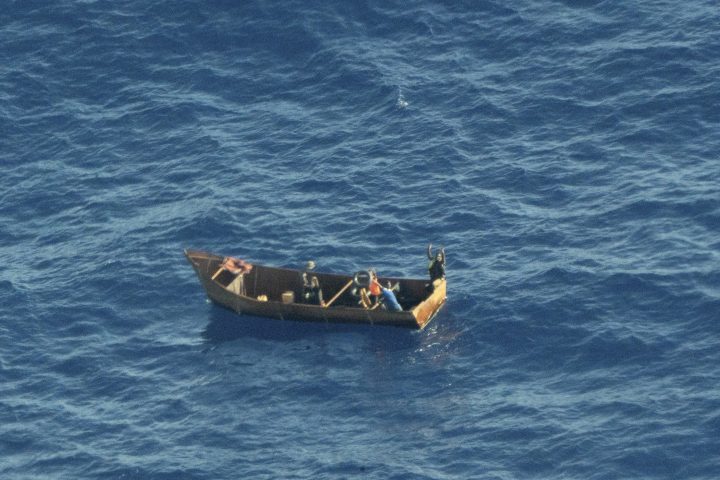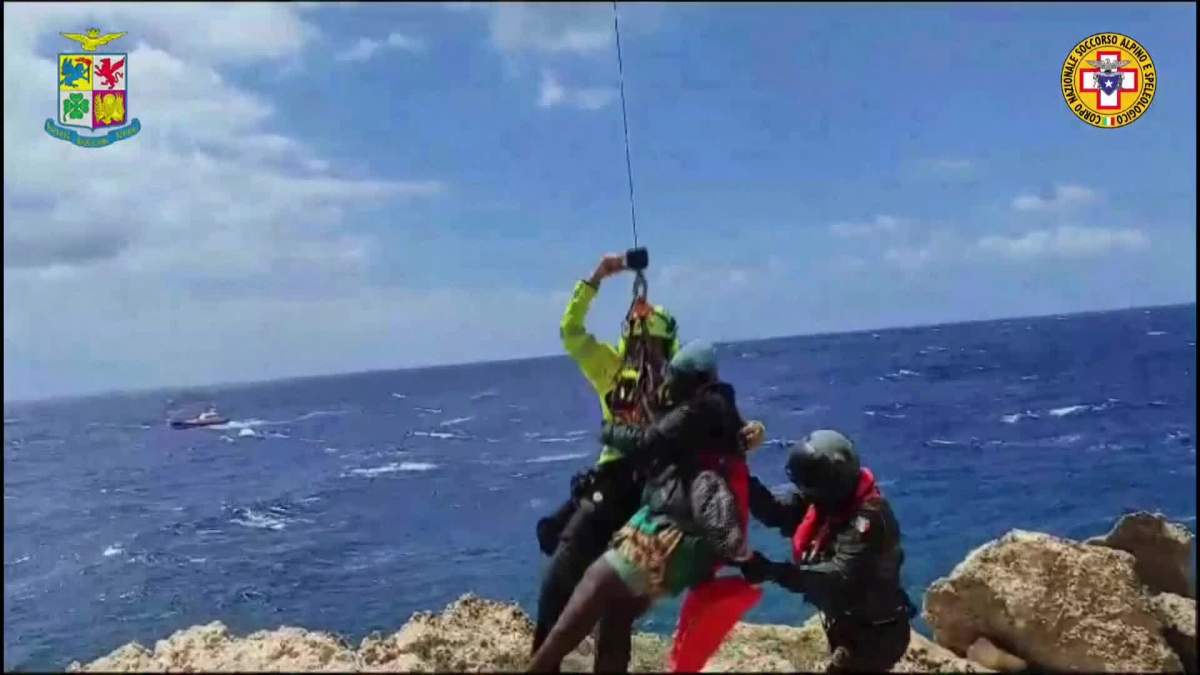Forty-one people are believed dead after a boat carrying migrants capsized off Tunisia in rough seas, the Italian Red Cross and rescue groups reported, citing four survivors who were rescued and brought to land Wednesday.

The survivors reported having left Sfax, Tunisia, on a metal boat with a total of 45 people on Aug. 3. About six hours into their voyage, a huge wave overturned the vessel, RAI state television reported.
The Red Cross said in a statement that the four survived using inner tubes and managed to climb onto another empty vessel nearby, evidence of the large number of boats setting out from Sfax and the rough seas that hit the area in recent days, causing several other capsizings too.
Photos released by the Sea-Watch humanitarian rescue group taken by its monitoring aircraft showed the four survivors waving for help from the boat and making their way to a commercial tanker, the Maltese-flagged Rimona. The migrants rescued by the Rimona were then transferred onto an Italian coast guard vessel which brought them to the Sicilian island of Lampedusa on Wednesday, said Sea-Watch’s Paul Wagner.
European Union border agency Frontex said that it had spotted a boat adrift in the Libyan search and rescue region and “informed all national rescue coordination centers in the region” as well as a mayday call given it was an emergency. Sea-Watch flew to the location, spotted the vessel and informed the closest merchant vessel, which was the Rimona, Wagner said.
According to the GPS location shared by Sea-Watch, the survivors were spotted inside the Libyan search and rescue zone around 66 kilometers (40 miles) from Tunisia and about 200 kilometers (125 miles) from Lampedusa.
The International Organization of Migration said that the shipwreck brings to more than 1,800 the number of people dead and missing in the central Mediterranean, the most active and dangerous migration route in the world.

Get daily National news
The Red Cross said the conditions of the four survivors, being cared for on Lampedusa, were good and that they would be transferred to the Italian mainland soon. The group said that three of the four claim to be minors, while the fourth is an adult male, all from Ivory Coast and Guinea. U.N. agencies, however, reported there was only one minor among them.
A doctor on Lampedusa who treated the four, Dr. Adrian Chiaramonte, said they had sustained “small wounds” and were suffering from dehydration, but “nothing major”.
“They said one boat saw them and kept on going. An hour later they saw a copter, then the oil tanker came” and rescued them, Chiaramonte told RaiNews24, adding that the survivors reported that altogether around 15 people had rudimentary lifesavers. No bodies have been recovered.
Rough seas over the weekend resulted in a series of shipwrecks and dramatic rescue attempts to save survivors. Italian authorities rescued dozens of migrants from the sea and from rocky reefs off Lampedusa, but at least 30 people were reported missing by survivors from capsized vessels. Eight bodies washed ashore back in Sfax.
Libya’s lawless coasts used to be the main departure point for migrant smuggling operations. But in recent months, Tunisia’s eastern coast, notably the port city of Sfax, has become the main launching point for migrants, mostly from sub-Saharan Africa, to get to Italy and other parts of Europe in small boats.
Recent departures may have been fueled by the fact that Tunisian authorities are increasingly cracking down on Black migrants. Tunisia’s President Kais Saied’s has promoted unfounded remarks that sub-Saharan migrants are part of a plot to alter the country’s identity and demographics fueling tensions between locals and Black foreigners.

Since early July hundreds of sub-Saharan migrants have reportedly been rounded up from coastal cities and dumped in deserted border areas with Libya or Algeria — countries with their own long track records of grave human rights violations, abuses against migrants and collective deportations.
Tunisia’s interior minister has conceded that small groups are pushed back into the desert border areas with Libya and Algeria, but has denied mistreatment.
Tunisian authorities estimate that around 17,000 sub-Saharan people are concentrated in the Sfax area currently.
According to the Interior Ministry, more than 93,000 migrants have arrived in Italy so far this year, more than twice the 45,000 who arrived during the same period in 2022. The top nationalities of those arriving are from Guinea, Ivory Coast, Egypt and Tunisia.
Italian Premier Giorgia Meloni, whose right-wing government includes the anti-migrant League party, has galvanized the EU to join it in efforts to coax Tunisia to crack down on smuggling operations, but the boats continue to set off.
Calls poured in Wednesday for Europe to develop safe and legal pathways of migration to prevent future deaths, echoing a refrain that follows the frequent incidents of deaths in the Mediterranean of desperate migrants seeking better, safer lives in Europe.
In a statement, the U.N. refugee agency, children’s agency and IOM said the steel-hulled ship was particularly inappropriate for a trip of this kind, particularly given the “prohibitive weather and sea conditions.”
“This highlights the absolute lack of scruples of traffickers who in this way expose migrants and refugees to extremely high risks of death at sea,” the agencies said.
- Olympic medallist wins bronze, confesses on live tv to cheating on girlfriend
- Parents condemn $176 fines for hostel staff after daughters died from tainted alcohol
- U.S. sinks to its lowest spot in new global corruption ranking
- Canadians wait for flights out of Cuba, aid struggling to get in amid U.S. energy blockade










Comments
Want to discuss? Please read our Commenting Policy first.